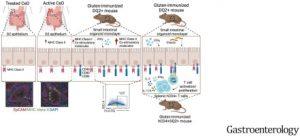Celiac disease, an autoimmune disorder affecting approximately 1% of the population, is characterized by an adverse immune response to gluten, a protein found in wheat, barley, and rye. This reaction leads to inflammation of the small intestine, impairing nutrient absorption and potentially causing severe long-term health complications. Despite its increasing prevalence, therapeutic options remain limited to strict adherence to a gluten-free diet.
Recent research has provided novel insight into the mechanisms underlying celiac disease pathogenesis. Traditionally, the immune system within the intestinal wall was considered the primary culprit in the inflammatory response to gluten. However, a new study has revealed a more detailed mechanism (Figure 1). The intestinal epithelium, the tissue lining the gut, plays a previously underestimated role in initiating and amplifying the immune reaction.
By utilising a sophisticated in vitro model of the intestinal epithelium, researchers were able to dissect the molecular interactions between gluten and epithelial cells. Their findings demonstrate that epithelial cells not only detect the presence of gluten but also actively participate in signalling the immune system. This epithelial involvement represents a novel target for therapeutic intervention.
The discovery that the intestinal epithelium acts as a key player in the celiac disease pathogenesis offers a promising avenue for developing targeted treatments. By understanding the specific molecular pathways involved, researchers can explore strategies to inhibit the epithelial response to gluten, potentially mitigating the ensuing immune-mediated damage. This research marks a significant advancement in our comprehension of celiac disease and holds the potential to transform the management of this chronic condition.
Jorunal article: Rahmani, S., et al., 2024. Gluten dependent activation of CD4+ T cells by MHC class II-expressing epithelium, Gastroenterology.
Summary by Stefan Botha











